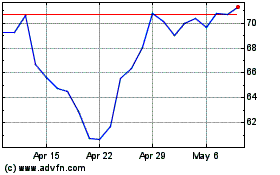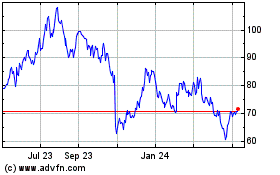AMD CEO Downplays Impact Hard-Drive Shortage Is Having On PCs
December 13 2011 - 1:08PM
Dow Jones News
Advanced Micro Devices Inc.'s (AMD) chief executive Tuesday
contradicted the chip company's main rival by downplaying the
impact hard-disk drive shortages are having on the PC market,
saying he doesn't expect much pressure on the quarter.
About 40% of the world's hard drives are manufactured in
Thailand, where months of heavy rains have disrupted operations.
Monday, AMD rival Intel Corp. (INTC), which supplies chips that
power about 80% of the world's computers, lowered its
fourth-quarter revenue guidance, citing the shortage's toll on
computer production.
Tuesday, AMD Chief Executive Rory Read said while there's
pressure in the market, he doesn't "see major pressure in terms of
the quarter." He said hard-disk supply in the channel at the
beginning of the period has kept the market "going pretty
well."
"In 1Q and 2Q, maybe you see some manifestations, but I wouldn't
bet against the supply chain," Read said at a Raymond James
conference. "They're very resilient."
He added AMD still has a lot of opportunity to take market share
even if the PC industry pares back its overall production.
In Thailand, most industrial zones that were inundated by the
floodwaters are now dry, though high waters linger in some areas
and authorities have warned it could be several months before all
the affected factories are up and running again, as companies
continue to assess the damage.
Many tech companies with operations in Thailand, including
hard-drive maker Western Digital Corp. (WDC) and component supplier
Hutchinson Technology Inc. (HTCH), have had to suspend some
operations there.
ON Semiconductor Corp. (ONNN)--which makes audio and
power-management chips used in mobile phones, cars and portable
electronics--late last week said it was ending all production at
its Sanyo Semiconductor unit sites in Ayutthaya, Thailand, and
would maintain only limited production at its Bang Pa In site.
"The bulk of the company's Thailand operations will be
permanently transferred to other existing ON Semiconductor
facilities that have available production equipment capacity and
excess floor space, and to some external subcontractors as
appropriate," the company said on its website.
Most production will be moved to Malaysia, the Philippines and
China, ON Semiconductor said.
Meanwhile, Read on Tuesday said AMD must focus more on its
customers and market than it does on its chief rival Intel in order
to gain share and boost performance. He noted AMD also needs to
focus on companies that license ARM Holdings PLC (ARMH, ARM.LN)
architecture, such as Qualcomm Inc. (QCOM).
"It's not that we turn our back on the competitors," Read said.
"It's that we become customer- and market-focused."
Read didn't dismiss the possibility for AMD to license ARM
architecture, saying it will depend on where the market goes and
what customers want.
"What's most important is that you always listen to the
customer," Read said. "When the customer speaks, the industry
speaks, you've got to listen."
He said it would be a "very simple" decision to work with ARM if
that was the direction the market went. But Read said AMD will
continue focusing on improving its x86-based chips.
Read added Intel, with its dominant position in the PC market,
will hesitate to make big changes as it seeks to protect the status
quo. And companies making chips based on ARM architecture will face
their own struggles with expanding into new markets, he said.
"We have a lot of IP and a lot of capability," Read said. "We're
going to continue to play those cards, but as you move forward,
making sure that you're able to be ambidextrous is definitely a
winning hand."
-By Shara Tibken, Dow Jones Newswires; 212-416-2189;
shara.tibken@dowjones.com
ON Semiconductor (NASDAQ:ON)
Historical Stock Chart
From Apr 2024 to May 2024

ON Semiconductor (NASDAQ:ON)
Historical Stock Chart
From May 2023 to May 2024
